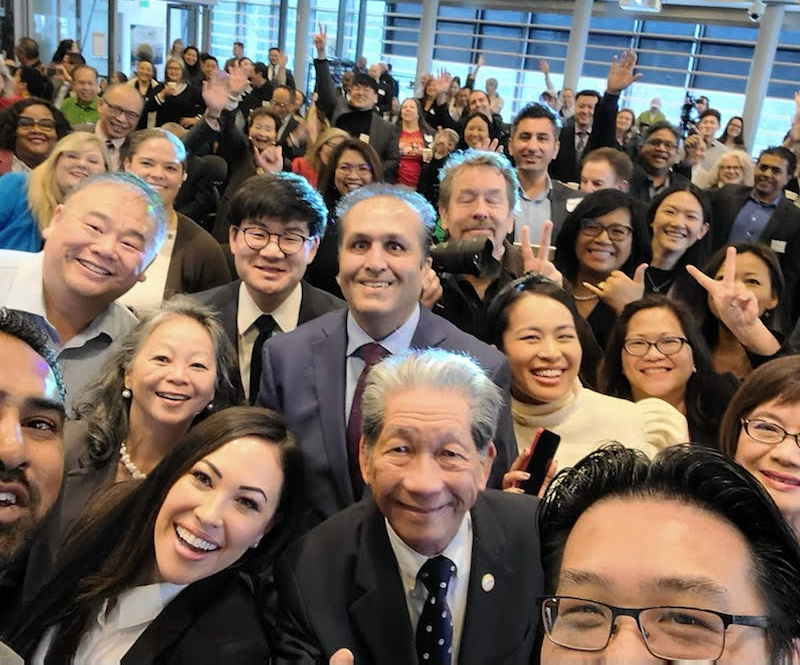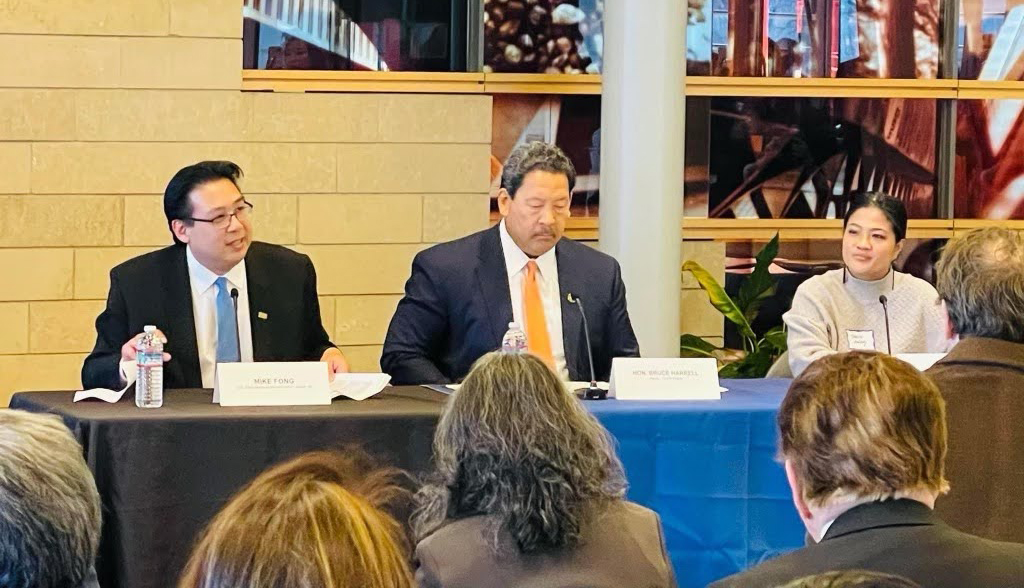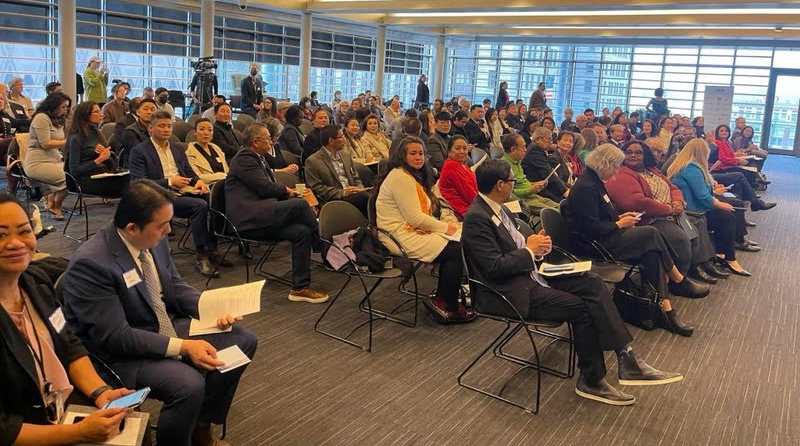By Mahlon Meyer
NORTHWEST ASIAN WEEKLY
It started, as many such events do, with a lineup of officials speaking to the audience. But the crowd was so jubilant, so effusive, that it transformed a somber economic summit about federal relief dollars for marginalized communities into a sort of coming out party of bright hopes and eager expectations.
“Looking around, I can see it’s the ‘Who’s Who’ of the Asian American community,” said Seattle Mayor Bruce Harrell, one of the speakers.
Indeed, when U.S. Small Business Administration (SBA) Regional Administrator Mike Fong, before the summit even started, asked everyone to take two minutes and get the inevitable group selfie out of the way, he was practically mobbed at the front of the room.

Members of the audience gleefully join SBA Regional Administrator Mike Fong for a group selfie. (Photo courtesy: SBA)
During a five-minute break, an organizer had to spend upwards of 10 to 15 minutes appealing to the crowd of attendees to take their seats for the next session—so jubilant and engaged were they in chatting and networking with each other.
Organizers put their number at around 200.
After a long and grueling three years of the pandemic, anti-Asian hate, vandalism, and other threats to the community such as infrastructure projects, the event had the feel of a giant sigh of relief—a feeling that help would come not just to sustain life, but perhaps offer a return to normalcy.
It was not immediately clear if these expectations were met.
Off the record
While a wide array of officials, both local and federal, offered sometimes staggering figures of federal money coming available for grants, it was impossible to verify if the actual tips and strategies for obtaining them, offered at the summit, were practicable and achievable.
The night before the event, one of the organizers told the Northwest Asian Weekly it was not allowed to report on the two breakout sessions following the many speeches given by officials.
These breakout sessions were to offer the actual nuts and bolts of how small businesses from marginalized communities were to apply for resources, grants, and loans—besides offering cutting-edge tips to the sectors of retail, hospitality, and restaurants—those hardest hit by the pandemic.
When the Northwest Asian Weekly asked this particular organizer—who asked that even the interdiction be off the record—the reason for the prohibition, the organizer merely repeated it.
A summit of coordination
The formation of the summit, the third in a row in a major city, seemed to reflect a new commitment to the Asian American (AA) and Native Hawaiian and Pacific Islander (NHPI) communities at the federal level. The regional economic summit was held in partnership with the SBA, the U.S. Department of the Treasury, the U.S. Department of Health and Human Services’ Office of Small and Disadvantaged Business Utilization, the National Asian/Pacific Islander American Chamber of Commerce and Entrepreneurship, and local leaders.
Just the coordination of so many agencies and partners appeared a feat in and of itself.
Putting his hand on the shoulder of Fong, at the end of his talk, Harrell said, “This guy is making me work hard. But working hard is good.”
A disconnect?
Still, there were signs of a disconnect, though subtle perhaps, between local needs and federal priorities.
The economic summit, according to officials, came out of recommendations made by a group of 25 commissioners who represent the AA and NHPI communities.
“This summit is a direct result of those recommendations,” said Rep. Pramila Jayapal in a video recorded address to the summit.
As if to highlight the central place that the commissioners held—they had been appointed by the Biden-Harris administration—president emeritus of International Community Health Services and longtime community leader Teresita Batayola led a panel discussion with officials from various federal agencies.
Since the new national equity strategy enacted by the Biden administration is aimed at uniting multiple federal agencies in equity practices, the panel showcased, in a visible way, the power that a local commissioner has to bend federal agencies to the needs of the AA and NHPI communities.
During the discussion, many of the equitable changes enacted by agencies, from the U.S. Department of Housing and Urban Development to the Environmental Protection Agency (EPA) to the Minority Business Development Agency (MBDA), appeared significant and groundbreaking. But the relevancy given to Batayola at a crucial moment seemed to come under question.
After each of the federal officials had explained steps taken to advance equity, Batayola asked them to sum up their advice to the entrepreneurs and community members in the audience in three words—a request not atypical in some Asian cultures.
Some officials said they felt put on the spot but came up with an answer. But at least one federal official said blatantly she was not going to follow Batayola’s request. Others simply ignored it.
New opportunities, old needs
Nevertheless, the summit reflected opportunities ostensibly created by new federal dollars released into the economy.
“There is so much new money flowing from the bipartisan infrastructure law and the Inflation Reduction Act, there is a lot more opportunity,” said Fong. “With the inflow of new money, there is a commitment to make sure a lot of that gets to small businesses.”
Nani A. Coloretti, deputy director of the Office of Management and Budget, and the highest-ranking Filipino American in the administration, said the summit was also in response to a very low rate of federal contracting among marginalized communities.
Port of Seattle Commissioner Toshiko Hasegawa presented statistics indicating that, while 10% of small businesses in the country are owned by AA and NHPI persons, only 2.8% of federal contracting went to them in 2020.
While AA and NHPI communities have grown by 40.7% since 2010, according to other statistics shared by Hasegawa, a large proportion still live below poverty level. In Whitman County, for instance, 94.8% live below the poverty level, she said.
At the same time, women earn much less than male counterparts. In the AA community, women on average earn 52 cents to the dollar compared to men. While in the NHPI community, it is only slightly higher—66 cents to the male-earned dollar.
Meanwhile, the many disasters of the recent years have only compounded these difficulties.
“Folks are still trying to dig themselves out of a hole,” said Chera Amlag, the owner of a local restaurant, wholesaler, and a real estate advisor to the City of Seattle who spoke at the summit.

From left: SBA Regional Administrator Mike Fong, Seattle Mayor Bruce Harrell, and Chera Amlag, entrepreneur and real estate adviser at the City of Seattle. (Photo courtesy: SBA)
Opportunities
During the introductory remarks, officials presented what appeared to be significant opportunities for small businesses.
These included contracting with the federal government. In 2021 alone, the federal government gave more than $25 billion in contracts for goods and services to the Pacific Northwest.
According to former Seattle deputy mayor Casey Sixkiller, now a regional administrator of the EPA, the agency has added a new pillar to its strategic plan, which involves elevating equity. He encouraged small businesses to look at the agency’s website for opportunities for environmental justice grants. At the same time, the EPA is on the verge of announcing $30 billion in resources for greening the economy—another opportunity.
The MBDA Business Center, permanently established by the Biden-Harris administration, has $93.5 million in funds.
“What we cannot do alone, we can do together,” said Frank Boykin, director.
Locally, the Port of Seattle has “opportunities that could catapult small businesses forward,” said Commission President Sam Cho.
Already, said Cho, 34% of airport dining contracts are with minority businesses. As one of its aims, the port wants to triple the number of women and minority-owned businesses it works with.
With $5.3 billion worth of capital projects over the next five years, opportunities might be immense.
“You will hear it’s not easy to do business with the port, but we can provide you with resources to be successful,” said Cho.
On a city level, Harrell mentioned a program that empowers businesses owned by persons from the black, indigenous, and people of color communities to move into vacant storefronts. The Seattle Restored Program, as it is called, has already empowered 30 small businesses and has plans to relocate 45 more.
Executive orders and direction
The origin of the summit was in May 2021, when Biden re-established the White House Initiative on Asian Americans, Native Hawaiians, and Pacific Islanders through an executive order. The initiative “engages federal agencies to improve interagency policy making, program development, and outreach, and address barriers impacting AA and NHPIs across the country.”
In January 2023, the economic summit series commenced following the release of the Biden-Harris national strategy which centers equity for a host of federal agencies.
On Feb. 16, President Biden signed another executive order to formalize his goal of increasing the share of federal contracting dollars awarded to small disadvantaged businesses by 50% by 2025.
Immediate consequences
One outgrowth has been an increase in incentives for CDFIs—loans targeted to businesses run by owners from disadvantaged communities that generally offer favorable interest rates. According to Coloretti, an incentive of $341 million is in the 2024 budget for CDFIs.
At the same time, increased language access for people with limited English will be required of many federal agencies. The initiative also promotes the disaggregation of data about traditionally underserved communities.
Data that is not disaggregated can obscure disparities, said Coloretti.
Next steps
The local SBA district in Seattle has a “whole host of programs” including trainings, connections with CDFIs, and many types of mission-driven lending, “from thousands to millions of dollars in resources,” said Fong.
He added, “Sometimes, we will hand you off to the right partner to match your needs. There is no wrong door to get the resources you need. Where there isn’t a door, we open it.”
To contact the Seattle SBA office, call 206-553-7310. Or email: SEAmail@sba.gov.
To read about offerings and resources on its website, go to:
https://urldefense.com/v3/__https://www.sba.gov/district/seattle__;!!K-Hz7m0Vt54!gJ8CJyJQzVk4sbQDtfAsu1DD-i3UFbtpaSMwI1eKOQ–CRPHpox-ajg8QdMe9vcw7qfHF0O-IYuDKEpO04ouyPmyUg$
Mahlon can be reached at info@nwasianweekly.com.




